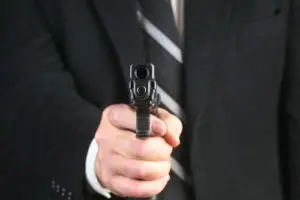
Assault is a serious criminal act in the state of California. Individuals can face a wide range of different assault charges, including:
- California Penal Code Section 240: Assault
- California Penal Code Section 245(a)(1): Assault with a Deadly Weapon
- California Penal Code Section 245(a)(2): Assault with a Firearm
Assault with a deadly weapon can be one of the more difficult assault charges to understand. Take the time to go over the exact repercussions for an assault with a deadly weapon charge right here. The Simmrin Law Group can even help you assess possible defenses for a PC 245(a)(1) charge.
We Can Define Assault with a Deadly Weapon Charges
Assault with a deadly weapon charges can apply anytime someone willfully uses a deadly weapon or force capable of causing great bodily injury on another person. An individual must be aware that they could harm another person to be charged under PC 145(a)(1).
California uses a very broad definition of deadly weapons. Any implement that could be used to cause a great bodily injury or death is considered a deadly weapon. This includes:
- Knives or Swords
- Clubs
- Baseball Bats
- Metal Tools
- Broken Bottles
- Rocks
- And More….
Note also that individuals can be charged and convicted of assault with a deadly weapon even if no one is hurt.
Go Over Examples of Assault with a Deadly Weapon
The following acts could be considered violations of PC 245(a)(1):
Man A gets very angry during an argument with Man B. Man A grabs a stick up off of the ground and attempts to hit Man B in the head with the stick. Man A misses, and Man B eventually gets away. Man A could be charged with assault with a deadly weapon.
Man C is out for a drive when he sees Man D, who stole his wife. He becomes enraged and jumps out of the car, drawing his pocket knife. He attempts to stab Man D, who protects himself by hitting Man C with a rock. Man C could be charged with assault with a deadly weapon. Man D, who acted in self-defense, should not face charges.
Understanding the Different Between Assault and Battery Charges
Battery is a criminal act that is often connected to assault. Assault charges can apply anytime someone intends to harm another person. Battery charges only apply if someone actually causes an injury. There are a number of battery charges that may be used in Los Angeles, including:
- California Penal Code Section 242: Battery
- California Penal Code Section 243(b) and 243(c)(2): Battery on a Peace or Police Officer
- California Penal Code Section 243(d): Battery Causing Serious Bodily Injury
- California Penal Code Section 243(e)(1): Domestic Battery
Individuals can get help handling both assault and battery charges from a professional Los Angeles criminal defense lawyer.
Go Over the Penalties for a Conviction Under PC 245(a)(1)
Courts in the Los Angeles area can treat assault with a deadly weapon as either a misdemeanor or a felony. This decision usually depends on:
- The Severity of Any Injuries Caused by the Assault
- The Lack or Presence of Physical Contact
- The Nature of the Deadly Weapon Used
Misdemeanor assault with a deadly weapon charges are less severe than felony charges. However, a misdemeanor conviction can still lead to up to 1 year of jail time. A felony conviction can result in 4 years in prison.
Focus on Criminal Defenses for Assault with a Deadly Weapon
A charge under PC 245(a)(1) does not automatically have to result in a conviction. Professional criminal defense lawyers can often build solid defenses for their clients by arguing:
Their Clients Acted in Self-Defense
Individuals in Los Angeles do not just have to stand there if their lives are threatened. You are allowed to protect yourself, even if that means harming someone else. A lawyer may be able to prove that you were acting in self-defense to beat an assault with a deadly weapon charge.
Their Clients Did Not Use a Deadly Weapon
As previously noted, the legal definition of a deadly weapon is very broad in California. However, it is sometimes possible to prove that an individual was not using a deadly weapon at the time of an assault. This could lower an individual’s charges to simple assault.
Get Professional Help Dealing with a PC 245(a)(1) Violation
It can be challenging to take on the court system on your own if you are accused of violating California Penal Code Section 245(a)(1): Assault with a Deadly Weapon. You can get professional help by contacting the Simmrin Law Group now. Our team can even offer you a FREE initial case evaluation.
Take charge of your future by calling us at (310) 896-2723 or filling out our online contact form.
